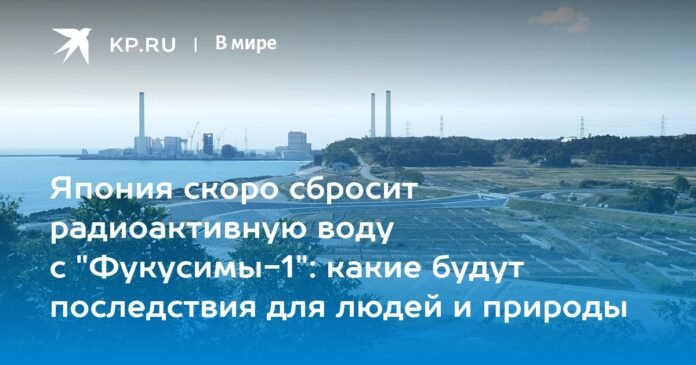After a long debate, Japan finally decided to release water from the Fukushima-1 nuclear power plant into the Pacific Ocean.
Photo: Shutterstock
After a long debate, Japan finally decided to release water from the Fukushima-1 nuclear power plant into the Pacific Ocean. During a meeting of those responsible for the future of the nuclear power plant closed in 2013, the Japanese Prime Minister, Fumio Kishida, announced the start date for the process of dumping radioactive water into the ocean.
– Regarding the specific release dates: if there are no contraindications due to weather and sea conditions, we have August 24, – confirmed Kishida.
Recall that the Fukushima-1 radiation accident was assigned the maximum level on the International Nuclear Event Scale. The flooding of the basements caused a total blackout of the nuclear power plant and the failure of the emergency cooling systems. As an emergency measure, it was decided to use 1.3 million cubic meters of seawater, in which 63 radioactive elements subsequently accumulated. Now this water is stored at Fukushima-1 in a thousand huge tanks, but almost 90% of its volume is already full.
Japan’s Ministry of Ecology and Natural Resources has promised that before it is discharged, the water will be filtered through the ALPS system, which will purify it of all types of radionuclides, with the exception of tritium, a radioactive isotope of hydrogen. This “superheavy hydrogen” poses a radiation hazard to humans by inhalation, ingestion through food, and absorption through the skin.
Due to the difficulty of purification, the Japanese could only dilute the water and bring the tritium concentration to 1,500 becquerels per liter. According to local officials, this is 40 times less than the standard adopted on the island for draining water from operating nuclear power plants into the sea. At the same time, they plan to dump water into the Pacific Ocean in stages, over 30 years.
It is true that, in any case, neither the countries of the region, nor even the Japanese themselves, liked such excuses. According to the Kyodo agency, 88.1% of those surveyed are sure that the discharge of water from nuclear power plants will cause reputational risks and economic damage to Japan. And exactly half of those surveyed categorically opposed the actions of the Kishida government; this is the highest figure since December of last year.
The IAEA, whose office opened in Fukushima 1 last month, has pledged to continue “impartial, independent and objective monitoring” of the water release phase. IAEA staff will make sure “everything meets safety standards” and provide updates once the release begins, said Rafael Grossi, the organization’s executive director.
Chinese Foreign Ministry spokesman Wang Wenbin called Tokyo’s decision “an erroneous move” and issued a stern warning to the Japanese. He also warned that the PRC “will take all necessary measures to protect ocean ecology, food safety and public health,” calling the Pacific Ocean the “heritage of all mankind.”
“If this radioactive water is safe, there is no need to dump it into the sea. If it is not safe, it is even more unnecessary to drain,” Wenbin concluded.
However, the authorities of Macao and Hong Kong, two special administrative regions of China, decided to ban the import of food from 10 prefectures of Japan. As of August 24, the import of sea salt and seafood, vegetables and fruits, dairy and meat products, bird eggs and other products will be suspended.
The official representative of the Russian Ministry of Foreign Affairs Maria Zakharova believes that the Japanese should offer interested states the opportunity to take samples at the site of the water spill.
“The company operating at this station was repeatedly found to be inconsistent with the information it provided,” Zakharova added.
But US Secretary of State Anthony Blinken said the US is fully “satisfied with Japan’s plans,” considers them safe and in line with international standards, including IAEA nuclear safety.
The Minister of Economy, Trade and Industry of Japan, Yasutoshi Nishimura, decided to carry out a kind of public relations company, which participated in the tasting of seafood from all over the country. When trying seafood from the Tohoku region, the region most affected by the Fukushima-1 accident, the official called for more consumption of his products.
– Tomorrow we intend to start pouring water from the nuclear power plant into the ocean. We guarantee the safety of seafood and will make every effort to expand its sale and consumption. I want to convey a sense of pride in local products,” said Nishimura.
expert commentary
– The Fukushima-1 water spill will, of course, have an impact on the ecosystem through the entry of tritium into the biological tissues of living organisms and its subsequent mutation due to its decomposition. This will carry the risk of “contaminated” food products entering the markets, Vladimir Pinaev, associate professor at the Department of Environmental Safety and Product Quality Management at the RUDN Institute of Ecology, told KP.RU. – In addition, tritium will be included in the water cycle, that is, it can be transported over considerable distances and fall with the rains outside the eastern region. Taking into account that the release is scheduled for 30 years and that the half-life of tritium is 12 years, a gradual increase in the radiation level and the content of the isotope should be expected. However, the question of the effect of tritium on the organism has not yet been fully studied. This explains the fact that standards for tritium content do not exist in all countries, and when they do exist, they differ by orders of magnitude and cause disputes among experts. Now it cannot be said exactly how the increased levels of radiation will affect biological resources and their consumers, but it can be assumed that the addition of such wastewater will certainly not contribute to the improvement of the world ocean.

